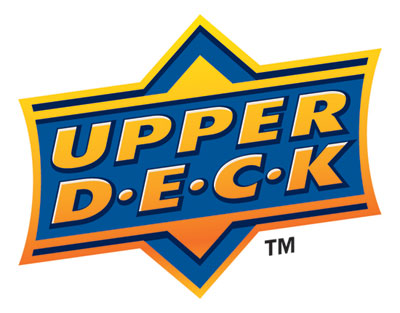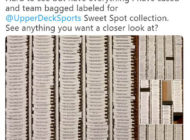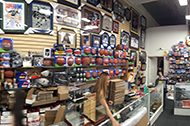Here’s the deal: I’ve been around this hobby for 20 years and have worked at Upper Deck for 12. I used to be the editor of Trading Cards magazine during the hobby’s heyday in the early ‘90s and spent ample time comparing, reviewing and writing about innovative sports card products. I watched price guides go up and down; industry trade shows catch fire with more and more excited collectors; and products being unveiled that made people stop and take notice. And more often than not, Upper Deck was the company that made people say: “Wow.” Very simply, they had products worth crowing about.

UD took the hobby by storm in 1989 with the release of its inaugural baseball set, headlined by the much-talked-about Ken Griffey Jr. rookie card (#1). That single, sought-after card catapulted through hobby price guides and reached as high as $150 on the secondary market. Its meteoric rise gave birth to more hobby periodicals and more price guides, not to mention hundreds of new hobby shops sprouting up throughout North America. Older, vintage sports cards were still on serious collectors’ radars, but it was Upper Deck’s initial set that made it possible for any collector to enter the market and turn a modest profit on their original investment. If somebody wasn’t seeking a quick return, they at least walked away with a better baseball card for their collection. The burgeoning hobby, as we know it today, was off and running.
Upper Deck’s debut baseball release also introduced the industry’s first-ever anti-counterfeit hologram on each of its cards. It was groundbreaking. That security device would revolutionize the industry, put competitors on notice, and force card counterfeiters out of business.
In 1990, Upper Deck introduced the first autographed cards in product with the release of its Reggie Jackson “Heroes of Baseball” inserts. Nolan Ryan autographed “Heroes” cards followed in 1991. Upper Deck debuted the hobby’s first-ever game-jersey cards inside Upper Deck Football in 1996. An actual game-used jersey swatch from the player was incorporated on the card front. In 1998, the hobby’s first digital trading cards, called “PowerDeck,” were unveiled by UD. Each beautifully designed trading card-sized CD-ROM was an audio/visual masterpiece that contained 60 seconds of video of the player featured! Babe Ruth bat cards and 500 Home Run Club member bat cards packed out shortly thereafter where an actual piece of a game-used bat used by the players featured was embedded on each of the card fronts. Collectors salivated at the mere thought.
Two years later, “Legendary Cuts” signature cards were released by Upper Deck, which contained the hobby’s first cut signatures of deceased legends and stars. High-end sets like Exquisite and Ultimate Collection were next. You get the drift. When it came to knocking the socks off of collectors, Upper Deck consistently delivered.
What I’ve noticed during my tenure here is that the folks at Upper Deck have worked hard to establish a loyal following of fans interested in purchasing a superior product. It’s as simple as that. So it’s a shame that after 21 years of dedicated service we’re no longer allowed to produce baseball cards showing MLB trademarks, logos and team names because we are, in fact, the company that attracted so many new customers to the category. They came buzzing like bees to honey. Topps may have had a monopoly on the baseball card market for 40 years, but things really didn’t start to flourish until UD arrived.
Its cutting-edge designs, full-color photography, glossy cardstock and anti-counterfeit hologram kick-started a hobby that was dying a slow death. But now the right to produce baseball cards goes exclusively to Topps, the industry’s 60-year-old grand-daddy, for at least the foreseeable future.
Major League Baseball believes that collectors are now the real winners with its decision to limit the playing field to just one licensed manufacturer. But does the collector really win in the end?

















17 Comments
No we don’t. Bravo! Well put and thank you for years of great cards. Legendary Cuts (pre 2007) are some of my favorite products of all time. In your listing of innovations you forgot Sweet Spot another classic.
I am very disappointed that Topps was awarded the exclusive licensee to produce baseball cards. I am just as disappointed that Upper Deck failed to assemble a legal team to beat this. While MLB enjoys an anti-trust exemption granted to it by Congress, Topps does not. It is my opinion that MLB violated federal law and the anti-trust exemption itself, in that they awarded a sole license to Topps. This created a monopoly. This is against the law. MLB has no right to extend its’ anti-trust exemption to another company or entity. The ones that will suffer are every card collector. While I am sure it will be business as usual for Topps, you will see the slow change in the quality and price of the products. A sole venture in any business is an almost guarantee for failure. Good competition does just the opposite. It ensures that products will be top-notch and as lower priced. It also creates healthy business environments that will ensure that it survives into the future. With no competition to deal with, Topps can, literally, do anything it wishes with NO consequences. MLB at a very minimum should allow at least TWO companies to be licensed to produce baseball cards and memorabilia. If that were to happen, and one company went out of business, and no other companies came forward seeking a license, then we wold have to accept a sole company. I am not knocking Topps at all except for this issue. Topps is a very fine company that produces great baseball cards. They support communities all the time. They encourage kids to do good in school and be good citizens. They are not afraid to try new things and venture into areas they are not familiar with. But I think they did just that and in a bad way. I also view MLB in the same light. I will close with my opinion that MLB and Topps took a cheap shot at Upper Deck and so far, have gotten away with it.
While I’ve been a Topps guy since I was a kid, your statement that “things really didn’t start to flourish until UD arrived” is 100 percent correct. I only recently got back into cards — thanks to my kids — and I find it troubling that MLB is limiting consumer choice.
Great post.
This blog sums it up. MLB Properties owned and Topps owned. Let’s look forward to another 40 plus years of stagnant/declining growth in the hobby.
bring upper deck baseball back
I’m not happy as a consumer to have so few choices now.
Whenever choice is eliminated from any marketplace consumers never win. The corporate mentality is to tell the consumer they win. Banks do it all the time.
While I agree with a majority of what you say, you still fall into the same trap that MLB Properties did. They assert that things are better for collectors based on some intangible, unquantifiable hypothesis. You assert that the future of collecting is bleak because Topps has been less than innovative with their designs in the past. This may truly be the case, BUT, until we see what Topps brings to the table now that they are “exclusive”, any speculation of disaster is just that.
As for a “monopoly” on the hobby, MLB Properties owns that not Topps. Topps just “benefits” from MLB Properties decision to award an “exclusive”.
Topps will be held to a ridiculously high standard for the foreseeable future, as they should be, and I hope that the imbecilic statement made by Mr. Orlinsky does not result in misplaced anger towards Topps. I also hope Topps finds a way to distance themselves from these comments.
The small stides they have made towards discovering who their customers are by embracing social networks like Twitter and Facebook should not be overlooked. The success of the ‘Million Card Giveaway’ should also not be overshadowed, it has breathed a bit of new life and excitement into the hobby. Let’s hope it is something that can be sustained for at least a full baseball season.
Time will tell.
Wow, great article Terry! UD has been great with new, innovative products that made me exciting to purchase their cards, and now that Topps has exclusive rights to baseball cards and Panini has exclusive rights to basketball cards, we can’t see anymore of your great products! These exclusive rights are stupid. Collectors should have a greater variety of choice between whose cards they want to purchase.
How true, how true. Upper Deck is simply the backbone of the hobby! Period!!!!!!!!!!!!!!
A similar problem has existed at different times in different sports in the Video Gaming industry. Whilst it’s a commercial decision for the respective leagues — and no doubt a lucrative one — to go exclusive with one company, it’s a damaging one to the fans.,
Obviously, a monopoly causes complacency and lack of innovation through competition. Madden video games caused this problem for NFL fans, whilst in contrast, the competition between EA Sports and 2K Sports in the NBA arena has meant that one company’s faults were picked up by the efforts of the other.
The fans need to speak out against the problem to the league if they want to see change.
(By the way, I’ve just discovered the UD Blog today. I’ve been a big fan of UD trading cards throughout the years — an integral part to sports fandom!)
A legalized monopoly? Wow, sounds like a great idea…..
Maybe we can hand the banking system billions and it will help the US economy and it’s citizens?
Maybe we can take all the Mexican Americans out of California? And that would be a good idea because Americans need those jobs that NOBODY wants.
Maybe we shouldn’t offer health care to every American citizen? It’s a privilege not a right to be healthy.
Sure, the above ironic statements are nowhere near the gravity of a baseball card manufacturer being given a monopoly in a business. But this is apparent and obvious proof that things are headed down a slippery slope in every facet of American Business, culture, rights, responsibilities, etc.
Interesting…
Since the NHL lockout Upper Deck has had the exclusive license to produce NHL/NHLPA cards, causing many companies to give up on hockey except for one (In The Game).
Don’t complain about exclusives when you’re doing the same thing yourselves, what Topps is doing with baseball you have been doing with hockey for years. Different tune when the shoe is on the other foot…
There’s no “monopoly” here. Upper Deck can still produce trading cards, just not trading cards depicting baseball players in professional dress. A monopoly would be if the sole right to produce trading cards of any type was awarded to Topps. If Upper Deck wanted to produce a set of Derek Jeter trading cards depicting Derek Jeter in various states of dress, such as a nike tee-shirt and shorts or a pair of jeans and a sweater, they could do so, provided Derek Jeter authorized the set. They could even produce a full set of players depicted in street clothes, featuring all current major league baseball players. While I agree that it’s a sad day for Upper Deck, it’s a bittersweet time for the hobby, in general. But, the hobby thrived when only a handful of sets were produced by three different companies, and despite there only being one company producing MLBP licensed cards now, there are many more sets to choose from than there were back in the mid-1980s.
Personally I find this article to be somewhat hypocritical. I will not dispute the fact that over the years, UD has had some amazing innovations that have sent the card-collecting hobby to great new heights because they really have. However, the final statement in this article, “Major League Baseball believes that collectors are now the real winners with its decision to limit the playing field to just one licensed manufacturer. But does the collector really win in the end?”
makes me laugh.
While I know it is the job of an Upper Deck employee to try and promote what is good for the company, I find it strange that with that statement. They’re pretty much complaining about it being unfair for Topps to have an MLB exclusive yet what they AREN’T mentioning is the fact that they have the exact same exclusive with NHLPA over hockey cards.
I agree that exclusives are bad for this hobby but PLEASE Upper Deck, don’t try and get your consumers to feel bad for something that happened to you that you are currently doing to hockey card companies like ITG. Thank goodness Upper Deck’s exclusive with the NHL expires soon…here’s hoping it doesn’t get renewed so other companies have the same fair chance.
Steve
How can you go on and on about this when you guys have done the same thing with hockey cards? It’s very hypocritical for you to write something like then when you’re on the wrong end of things, but when you’re the winner you don’t care. Spare my sympathy.
Yep, Steve has it right. Stop being such hypocrits Upper Deck. Did the collector really win in the end when you were given the exclusive NHL license?
I’m neither discounting nor advocating the exclusivity factor. What I was merely trying to convey was whether or not the industry and its avid baseball card collectors will, in fact, as Major League Baseball’s mouthpieces stated, be better off without Upper Deck producing league-licensed cards. By the sheer volume of unique, first-of-their-kind innovations that UD brought to the hobby marketplace, that’s where I think the baseball card collector will now lose. This is not to say that Topps can’t go out and try and one-up its former competition. It’s just to say that Topps hasn’t done so to date, so I guess we’ll just have to wait and see if they can deliver. Let’s face it, Topps Chrome and Refractors cards were great when the came out, but that was more than 10 years ago and they really haven’t spiced things up a whole lot since.
As for Upper Deck being awarded the NHL license, there’s a little back story that might help you guys understand the nature of our industry at that time. Upper Deck was granted the exclusive hockey license following the NHL lockout in 2004-05. Plenty of card companies were looking to move away and distance themselves from hockey at that point, whereas Upper Deck saw it as an opportunity to rejuvenate and rebuild the category. We believed in the sport and its players and knew that we could deliver a superior product to its fans. And that’s just what we did. Beyond some of the incredible dinosaur bone cards found in Upper Deck’s recent Champs Hockey releases – where the Ice Meets the Ice Age – we’ve had other great sets come out including The Cup, O-Pee-Chee Premier, UD Black and even Collector’s Choice. Some of these sets didn’t even exist before the exclusive license was awarded to UD, but now they all perform like gang-busters with some really cutting-edge cards inside. And that’s a good thing for the industry.